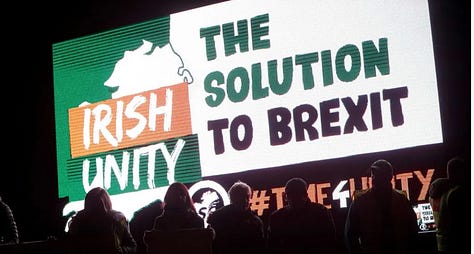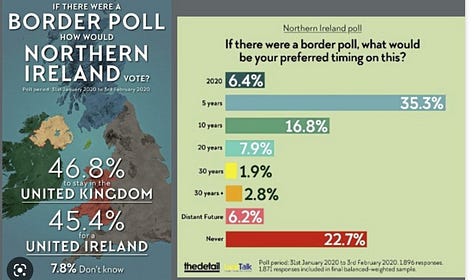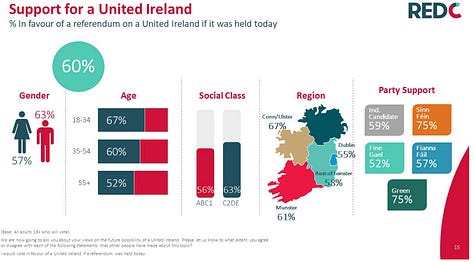Gilded Lineage
Irish America make pilgrimages ‘home’
US President (POTUS) Joseph R. Biden, Jr. was in Ireland much of last week.
He landed in Belfast to mark the 25th Anniversary of the Good Friday Agreement.
His only ‘official’ event in NI was a speech at Ulster University.
He focused on hope, and steered-clear of giving offence to the notoriously insult-seeking vessels who inhabit the political leadership there; notwithstanding the clear message that without a functioning power-sharing executive, time and tide were being wasted (hint, hint - certain Unionist political leaders).
His stay in Northern Ireland itself was brief, and his private engagements with the UK Prime Minister and Stormont’s political leadership were a stark contrast to his comparatively-languorous stay in the Republic of Ireland for the balance of the week. In the South he visited distant relatives, spoke to the Dáil Éireann (the Irish Parliament), went into pubs (where some gaffes made commentators more frothy than the Guinness) and did walkabouts.
(Note: the Terrorism Threat level in Northern Ireland was raised recently because of dissident paramilitary threats, a reason denied by White House officials as having any effect on his plans).
Still, what POTUS said while he was in Northern Ireland is - in my view - at least secondary to what he left behind there.
Or, should I say, whom he left behind.
Joseph P. Kennedy III is, well, a Kennedy. He was born into the lineage and unfulfilled dream of the Kennedy-Camelot, and has Democratic political connections out the ying-yang.
My granny, god rest her, would have been beside herself to have a living, breathing Kennedy walking around her country; and she’d likely not have alone in that.
Just days before Christmas in 2022, President Biden appointed him to the bureaucratic-sounding role of “Special Envoy to Northern Ireland for Economic Affairs”.
I’m sure most of us couldn’t recall any other inhabitant of this role (I won’t even get into how many US diplomatic posts are bought-and-sold through campaign donations) - most NI Envoys have been extremely low-profile - but there’s one of particular note: Senator George Mitchell.
This was the same official job President Clinton appointed Mitchell to in 1995, which turned into a nearly 6-year odyssey wherein he chaired the peace talks leading to the Good Friday Agreement; and a lifetime’s worth of post-resident service in support of the GFA.
The promise by Clinton to appoint such an Envoy during his 1992 campaign for the Presidency was not well-received in Britain, who saw it as meddling in their internal affairs; hence the bureaucratic title, and not ‘Peacemaker-in-Chief’. Over time, that animus has turned to admiration.
Last year, in an appearance before a Dáil Committee, former British Prime Minister Tony Blair’s Chief of Staff Jonathan Powell (credited with himself playing a pivotal role in the talks), noted that Sen. Mitchell was “…quite extraordinary and played a major part in the success of the Good Friday Agreement negotiations and implementation.”
But most of those Envoys-in-between Sen. Mitchell and Joe Kennedy haven't had the prevailing circumstances where rising to the moment was in, or on, the cards.
Indeed, Powell opined about this to the joint Dáil Committee last year: “Subsequent envoys also played more or less important roles depending on what was going on. Richard Haass played an important role when he was the envoy. I am slightly in two minds about whether an envoy now would be helpful. It would only be helpful if it was acceptable to both sides. In the case of George Mitchell, leaving aside his saintly patience in being prepared to sit down for so long and take a lot of grief, and his commitment to doing it, he was trusted by both sides. He really was. That was enormously important. If an envoy is going to be useful, he or she will have to be able to win the trust of both sides in Northern Ireland. It is only worth doing in those circumstances.”
Powell’s comments came in the weeks following the historic Northern Ireland Assembly elections last May, in which Sinn Fein topped the poll - marking the first time a nationalist party had done so since partition. The Democratic Unionist Party (DUP) refused to enter the power-sharing executive — and still refuse to — over Brexit-related issues surrounding the Northern Ireland protocol.
So back to Kennedy, and why I’m asserting that the true legacy of Biden’s policy and practice in the region is likely to be, well, him.
In most ways, I think it’s fair to say I’m not naive about politics, or its practice. I’ve helped fight a fair few campaigns, monitored elections in some tricky locations, and try and teach the subject to sometimes-disinterested 18-22 year olds at Acadia University. I have been accused of cynicism more than idealism, about politics.
On the other hand, I’ve become more convinced that a path to addressing most problems in the world can generally be opened up with the simple - if challenging - act of listening.
Sen. Mitchell’s famously-toned patience muscle is widely-credited with helping the parties achieve the breakthroughs required in reaching the GFA. He isn’t credited with personally crafting language that was somehow revelatory, leading to agreement. Civil servants I’ve spoken with make the point that he didn’t personally write much of anything - a fact he himself acknowledges. But he provided them the space and time to find the compromise language and pathways through his patient, unwavering and genuine commitment to listening to all perspectives.
As President Biden headed South from Belfast last Wednesday, his Envoy stayed behind, spending the balance of the week meeting (and tweeting) with various folks around Northern Ireland. He’ll stick around this coming week for the Agreement 25 conference, and the Clinton’s visit.
It’s the timing, not only the fact, of his appointment that I think is of major potential impact.
Who knows whether Biden will run for re-election, let alone win. We’ll find out sometime after November 5, 2024 who will occupy the White House from January 2025 - 2029. But that election isn’t the one that will most impact those living on the island of Ireland.
Elections in both the Republic, and likely another that could lead to the reestablishment of the power-sharing Executive via Stormont, will determine the direction (and duration) of the project of Irish Unity.
If Sinn Fein win (South, and/or North), and preparations for a Border Poll formally begin - including, quite possibly, the setting of a date for such a referendum “within a decade” - the negotiations that led to the GFA may look like an appetizer compared to the main course of negotiating things like: the question to be put, the timing, the method of voting, ‘who’ gets to vote, and then possibly some form of union on the island of Ireland, formal separation from the UK, and on it goes.
It’s a long putt, to be sure; but one that’s sure to be attempted soon enough.



The parties involved there — Irish America and the US Administration chief among them (although not technically involved other than as a ‘guarantor’), will be legion.
At a GFA-focused conference at Georgetown University in mid-March, I sat in the audience - a mix of Washington and Northern Ireland’s grandees on tour - as Kennedy outlined how he approaches the world, and his new assignment.
He said that he will bring to his new role the life lessons he has learned about politics, namely that:
all politics is local (with which he credited former US House Speaker Tip O’Neill);
all politics is personal (to which he credited his great-uncle former Senator Ted Kennedy); and,
his personal belief is that all politics is economics.
Now, this might just have been a cute turn-of-phrase in which he aligned himself with giants of democratic politics, and walked the line that his appointment is about economics (and not, save us, about politics). But I don’t think so.
He finished his remarks at Georgetown alluding to the “country of Northern Ireland” - hardly a controversial turn-of-phrase amongst Republicans and Nationalists - but not something most Unionists would countenance.
There is some speculation that Biden appointed Kennedy in part because he wanted to neutralize a potential primary challenger for the Presidency…but that feels like pretty weak sauce. Long one of the rising stars of the Democratic Party, Kennedy mis-stepped when he launched a primary challenge to longtime Massachusetts Senator Ed Markey in 2020 - and lost.
His timing was off in that misadventure, and he’s debited a bit too much political capital state-side as a result.
He needs to make some deposits, and rebuild that political capital at home - something that an intermestic political issue like the “Irish question” can seriously help him with.
Ultimately, this could be a serious twofer.
Gaming-out the prospects of Kennedy’s future domestic political path, while fun and interesting, is secondary to the impact he may be positioned to have on Irish unity. If his impatience at trying to displace Sen. Markey from Senate a couple of years ago, can be replaced with a focus on building his patience muscle - as Sen. Mitchell so ably did - his political ‘fitness’ could be the best thing President Biden left behind in Ireland last week.
Recommendations:
Book - Say Nothing, by Patrick Radden Keefe. This book has been widely-hailed as providing insight into the Troubles, refracted through the lens of the life and loss of Jean McConville; and it’s a great read, or listen.
Music - Snow Patrol are my favourite band. They have many, many great songs - and I’ll recommend some more as we go along. Gary Lightbody, their lead singer/songwriter, is participating in a special event this week during the Clintons’ visit and the Agreement 25 conference, alongside Derry Girls creator Lisa McGee.
This song of the band’s, Run, is anthemic to so many people - almost as famous as Chasing Cars. Here’s the story behind it’s creation.







